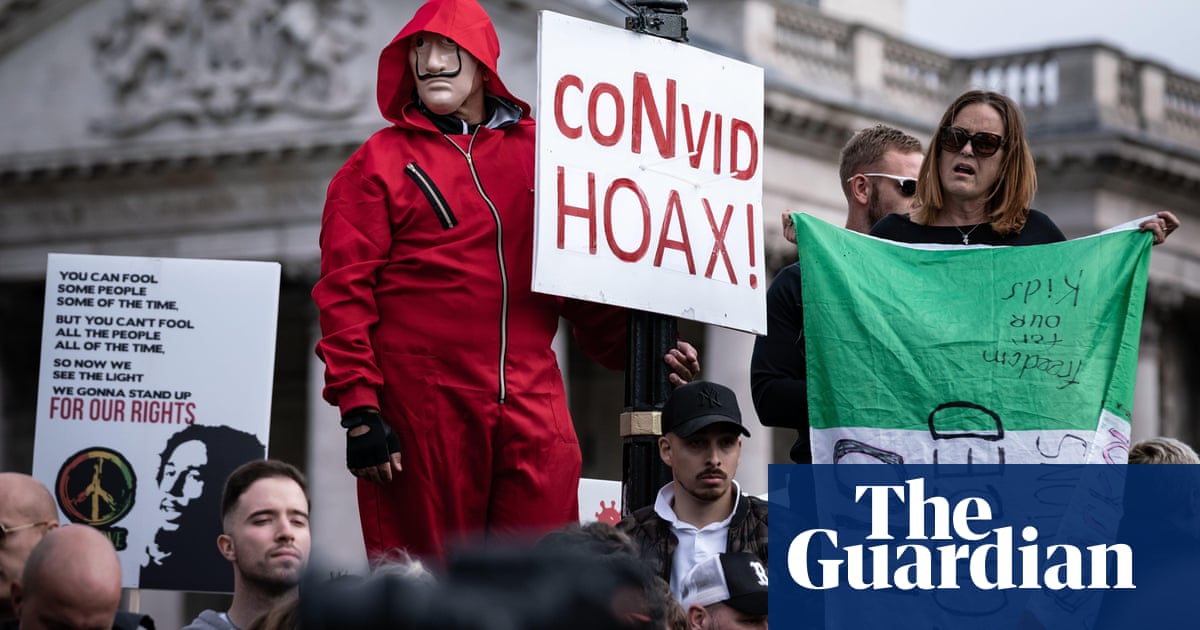Quarter in UK believe Covid was a hoax, poll on conspiracy theories finds

The UK is home to millions more conspiracy theorists than most people realise, with almost a quarter of the population believing Covid-19 was probably or definitely a hoax, polling has revealed.
About a third of the population are convinced that the cost of living crisis is a government plot to control the public, and similar numbers think “15-minute cities” – an attempt to increase walking in neighbourhoods – are a government surveillance ruse, and that the “great replacement theory” – the idea that white people are being replaced by non-white immigrants – is happening.
The findings, on the eve of the first evidence session of the UK’s public inquiry into the pandemic, which killed more than 227,000 people in the UK, come from an April survey by Savanta for King’s College London (KCL) and the BBC.
It found beliefs were shared through social media – most commonly YouTube and Facebook – and fuelled by websites including 21st Century Wire, The Light, The Exposé and Breitbart, the last of which was run by Donald Trump’s former adviser Steve Bannon.
One in seven people – about 6 million adults – believe violence is a fair response to some alleged conspiracies.
The general public underestimates the number of conspiracy theorists by approximately 4 million adults, according to the researchers who uncovered what they described as “shocking” attitudes.
“Protest is a key part of a healthy democracy and people will have sometimes legitimate concerns about the motivations behind government and others’ actions, but it’s worrying that around one in seven say that violence would be acceptable in protests against, for example, government digital currencies or 15-minute cities,” said Prof Bobby Duffy, the director of the Policy Institute at KCL.
Social media are the most likely places for people to first encounter conspiracy theories but people who read publications such as The Light were much more likely to believe in conspiracies than the wider population.
Headlines in a recent edition of the UK-based publication include “Climate CO2 hoax – how bankers hijacked the real environment movement” and “Control over money will end in total slavery”.
Conspiracy theories often develop out of real-world problems and anxieties. For example, rising interest rates and inflation, which reduce affluence and leave families struggling, can fuel a belief that powerful forces are plotting to deliberately impoverish certain sections of society.
“These findings underline the importance of conspiracy theories in explaining how many people understand politics and the events which shape their lives,” said Dr Rod Dacombe, a reader in politics in the department of political economy at KCL. “For some people, conspiracy theories provide the main focus of political participation and the primary means through which they understand what is going on in the world.”
Nineteen per cent of people in the survey said it was true or probably true that “the UK government carried out the 2005 attacks on the underground in London to encourage support for war in the Middle East”, and 18% said it was definitely or probably true that “the Manchester Arena attack involved ‘crisis actors’ who pretended to be injured or killed – people weren’t really killed or injured”.
Three out of 10 people thought the “Great Reset” initiative announced by the World Economic Forum in 2020 was a conspiracy to impose a totalitarian world government. Between a fifth and a quarter of people – 8 million to 10 million adults – said they would protest against the introduction of central bank digital currencies, a “deep state” of military, intelligence and government officials who try to secretly manipulate government policy, “15-minute cities” and against vaccines.
Men were about twice as likely as women to say they would participate in direct action.
This article has been archived for your research. The original version from The Guardian can be found here.

